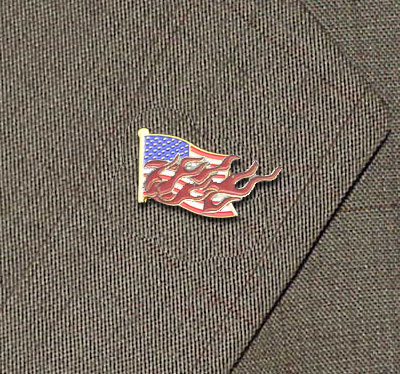If you’ve been keeping up with the US Democratic primary, you’ve probably heard what a piss-poor job ABC did conducting the Pennsylvania debate. It sometimes floors me that Jon Stewart et al. often give more credible news and commentary than the major news outlets. One of the more bothersome bits to come out of the debate was ABC handpicking Nash McCabe for a voter question. It wasn’t so much her obvious bias that bothered me; another voter could always be interviewed to provide a counterpoint (not that ABC did). What bothered me was that her vote comes down to whether or not a candidate is willing to wear a lapel pin of the American flag. Some may think big deal, until you realize that she’s probably not alone in how she makes political decisions. That somehow one’s appearance is a reflection of one’s performance. That one’s patriotism is measured by how often you’re willing to display the flag. That somehow symbols are greater than words and actions. (A Digg commenter aptly referenced the scene from Office Space where Joanna quits because her manager hounds her about wearing flair despite being a productive employee.) It’s really depressing to think that people do make important decisions based on such trivial criteria. Just another example of why the US education system needs improvement.
Her attitude reminds me of those who want to criminalize burning the US flag—a perfect example of people getting obsessed with their own personal dogma and taking nationalism to a detrimental extreme. It’s great to be proud of your country, but when that pride starts to encroach on the rights bestowed to that country’s citizens (or used to continue the state’s oppression of its citizens *cough*China*cough*), you’re doing your country a disservice. A true American patriot would understand their history and the US Constitution and know that flag burning is not just implied but encouraged when the government has failed to answer to the people. As such, given the questionable actions of the Bush administration, I would much rather see a candidate express their opposition by wearing a lapel pin like this:

But seeing how such boldness is rarely rewarded in politics, I doubt we’ll ever see someone sporting a pin like that anytime soon, short of another revolution. And just to head off the question, the pin does not exist. The image is a composite of three other images, i.e. it was shopped.